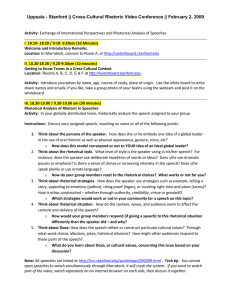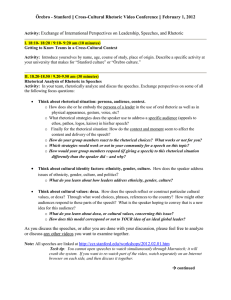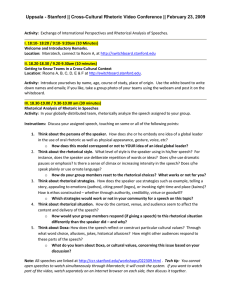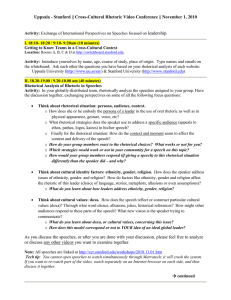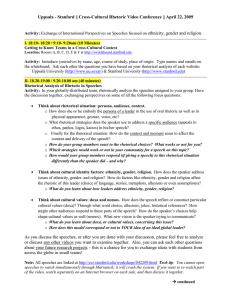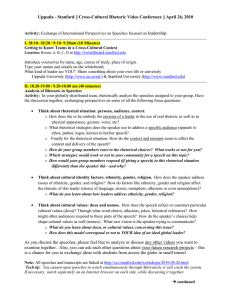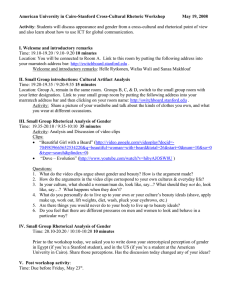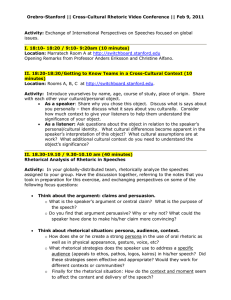2010.02.03.LessonPlan.USOrebro
advertisement
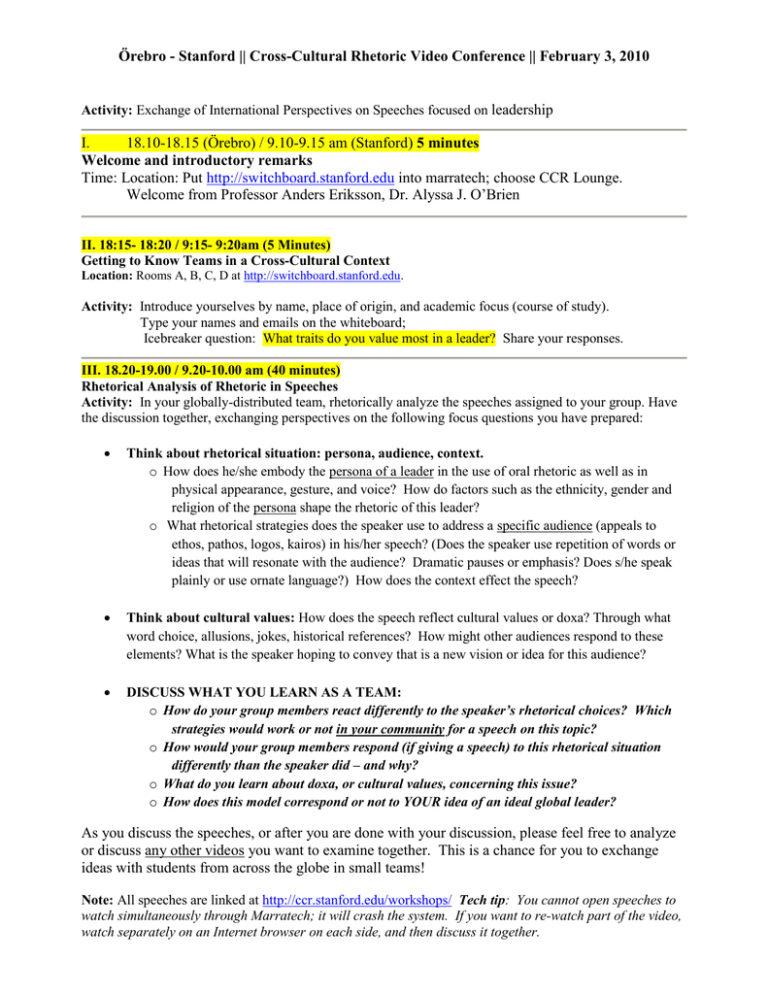
Örebro - Stanford || Cross-Cultural Rhetoric Video Conference || February 3, 2010 Activity: Exchange of International Perspectives on Speeches focused on leadership I. 18.10-18.15 (Örebro) / 9.10-9.15 am (Stanford) 5 minutes Welcome and introductory remarks Time: Location: Put http://switchboard.stanford.edu into marratech; choose CCR Lounge. Welcome from Professor Anders Eriksson, Dr. Alyssa J. O’Brien II. 18:15- 18:20 / 9:15- 9:20am (5 Minutes) Getting to Know Teams in a Cross-Cultural Context Location: Rooms A, B, C, D at http://switchboard.stanford.edu. Activity: Introduce yourselves by name, place of origin, and academic focus (course of study). Type your names and emails on the whiteboard; Icebreaker question: What traits do you value most in a leader? Share your responses. III. 18.20-19.00 / 9.20-10.00 am (40 minutes) Rhetorical Analysis of Rhetoric in Speeches Activity: In your globally-distributed team, rhetorically analyze the speeches assigned to your group. Have the discussion together, exchanging perspectives on the following focus questions you have prepared: Think about rhetorical situation: persona, audience, context. o How does he/she embody the persona of a leader in the use of oral rhetoric as well as in physical appearance, gesture, and voice? How do factors such as the ethnicity, gender and religion of the persona shape the rhetoric of this leader? o What rhetorical strategies does the speaker use to address a specific audience (appeals to ethos, pathos, logos, kairos) in his/her speech? (Does the speaker use repetition of words or ideas that will resonate with the audience? Dramatic pauses or emphasis? Does s/he speak plainly or use ornate language?) How does the context effect the speech? Think about cultural values: How does the speech reflect cultural values or doxa? Through what word choice, allusions, jokes, historical references? How might other audiences respond to these elements? What is the speaker hoping to convey that is a new vision or idea for this audience? DISCUSS WHAT YOU LEARN AS A TEAM: o How do your group members react differently to the speaker’s rhetorical choices? Which strategies would work or not in your community for a speech on this topic? o How would your group members respond (if giving a speech) to this rhetorical situation differently than the speaker did – and why? o What do you learn about doxa, or cultural values, concerning this issue? o How does this model correspond or not to YOUR idea of an ideal global leader? As you discuss the speeches, or after you are done with your discussion, please feel free to analyze or discuss any other videos you want to examine together. This is a chance for you to exchange ideas with students from across the globe in small teams! Note: All speeches are linked at http://ccr.stanford.edu/workshops/ Tech tip: You cannot open speeches to watch simultaneously through Marratech; it will crash the system. If you want to re-watch part of the video, watch separately on an Internet browser on each side, and then discuss it together. Page 2 of 2 CCR Video Conference: February 3, 2010 IV. 19.00-19.15/ 10.00-10.15 (15 minutes) Collaborative Group Work Activity: Prepare a statement from your team to present to the other groups on the following: o What conclusions have you reached about how a leader or speaker would have to change his or her persona/speech/delivery to communicate effectively across global audiences? How does this model correspond or not to YOUR idea of an ideal global leader? Answer using rhetorical terms and also be as concrete as possible; revise one line of at least one speech for a different audience to share as evidence Instruction: Choose 2 speakers (1 speaker from each side) from your group who will deliver your statement & who will present the evidence. Prepare one revised line from one speech as evidence for your answer. Practice presenting with your team members. Time limit: 2 minutes per group. V. 19.15-19.30/ 10.15-10.30 (15 minutes) Presentation of Team Statements and Closing Remarks Activity: Presentation of knowledge; teaching other students about cross-cultural learning Goals: To learn effective communication across cultures and as mediated through technology; to develop active listening expertise; to teach others about persona and cultural values; to learn from others Location: In Marratech, switch to CCR LOUNGE, at http://switchboard.stanford.edu Instructions: 1. Each Team will present its statement of learning and a revised line from at least one speech as evidence. 2. Listeners can type into the chat words of praise or feedback. 3. Closing Remarks by Professors Anders Eriksson and Alyssa O’Brien. VI. After the Video Conference 1. Debrief at Individual Universities: What did you learn about intercultural communication and global rhetoric across cultures? 2. Please post a reflection on today’s video conference as a comment on the CCR blog at http://ccr.stanford.edu – click on Blogging, then “Read the Blog” – choose Feb 3 2010 post. 3. Keep in touch on Facebook! Join the Group “Cross-Cultural Rhetoric” ** Thank you for your active participation! We hope you enjoyed this opportunity to for speaking and writing with real audiences across the globe.** -- Anders, Alyssa, and the whole CCR team
